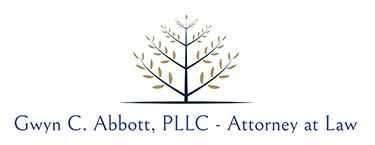Gwyn takes a unique approach to estate planning with her clients. Instead of the estate-planning process being confusing and intimidating, Gwyn makes sure that her clients understand what each piece of their estate plan is and what it will do for them before and after death. This approach makes clients feel confident about leaving with a plan that is suited to their specific needs and wishes.
What is an estate?
Your estate is made up of everything that you own. This includes your real estate, cars, jewelry, bank accounts, investment accounts, etc.
What is an estate plan?
In a nutshell, your estate plan is the package of documents that determines how, when, and to whom your estate goes when you pass away. Additionally, a well-drafted estate plan will also include documents that provide for your financial and physical well-being while you are living but are incapacitated (temporarily or permanently).
Who needs an estate plan?
Many people believe that estate planning is only for the elderly or the wealthy. This is absolutely not true. No matter your age or assets, if you become ill or if you and/or your spouse pass away unexpectedly, having an estate plan will make things easier and less costly for your loved ones.
Single, with or without children: Without an estate plan, if you are single and something happens such that you become incapacitated (injury, illness, mental health, etc), a Court would decide the person(s) to take care of your finances and your medical decisions. Worse yet, if you have minor children and you find yourself incapacitated, if you do not have anything in place in an estate plan, the Court determines who takes care of your children as well.
Married, with or without children: In the event of your incapacity (injury, illness, mental health, etc), sometimes a spouse can take care of a limited number of issues; however, a spouse does not have the right to stand in the shoes of his or her spouse to be able to do absolutely everything that may be necessary. Without an estate plan, the Court will have to get involved to make those decisions for you or your spouse.
Children: If you have minor children, without an estate plan, the Court will have to determine who gets custody and care of your minor children. With an estate plan, you have the opportunity to contemplate and chose that person(s) and have the peace of mind that your wishes will be carried out. If you have children over the age of 18, an estate plan can take care of concerns such as you wishing to keep them from getting cash/assets immediately upon your death – maybe they are financially irresponsible, or maybe you don’t know yet if they could handle an inheritance wisely.
Children from previous relationships: Many people wonder if their children will get any part of their assets if they pass away before their spouse from a 2nd marriage. Without an estate plan and you’re the first to pass away, your children have no claim to assets that get passed to your spouse, cutting off any rights of your children.
Children or loved ones that receive government benefits: If you have a child that is disabled, you will want an estate plan that considers his or her disability such that an inheritance from you does not interrupt any benefits s/he is receiving. If s/he receives an inheritance outside of an estate plan carefully crafted for him/her, his/her benefits may very well be reduced or terminated.
Business owner: Whether your business consists of only you, or if you have numerous employees, you can create plan in the event of your incapacity (temporary or permanent) or death (succession planning).
Opinions of Others: Has your friend, neighbor, or financial planner told you that if you don’t have a trust it will be catastrophic when you pass away? This may not be true at all. The need to have a trust is determined by many factors and one plan certainly does not fit all clients. Gwyn can help you figure out if you would benefit from having a trust.
What are some benefits of creating an estate plan – no matter your wealth?
- You, not a judge, get to determine while you are alive, who will be the Guardians of your minor children.
- You will be able to protect government benefits that a child may be receiving if that child inherits assets.
- You, not a judge, will be able to determine who manages your minor children’s inheritance.
- You can keep money in trust so that your adult children cannot spend it all immediately.
- You, not a judge, get to determine the person that distributes your estate after you pass away.
- You, not a judge, are able to appoint a person that can, in the event of your incapacity, take care of your daily business.
- You are able to contemplate and make decisions regarding your end-of-life care, and to appoint a trusted person to carry out those wishes for you.
- You are able to appoint someone as your funeral representative so as to avoid family quarrels at the funeral home.
- Your loved ones may be able to avoid unfavorable tax consequences.
While creating an estate plan can seem daunting, Gwyn will help you through every step from beginning to end. When you are finished you can rest easy knowing you have done everything possible to make things easier for your loved ones in the trying times after death.
Gwyn is happy to provide free (in most cases) post-planning services such as speaking to loved ones or those you have appointed as fiduciaries for you.

